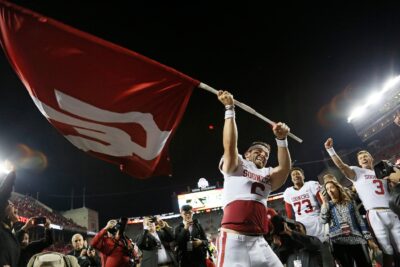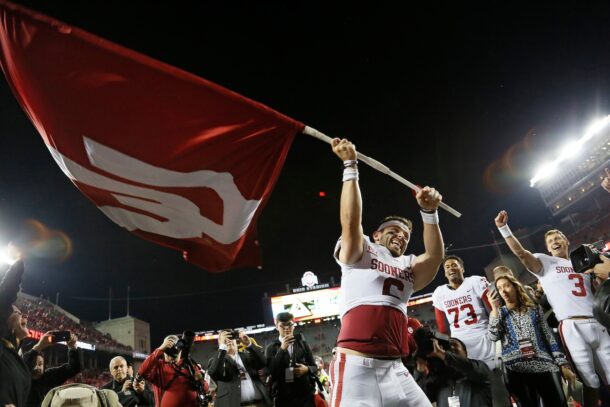
Florida football: A deeper dive into how Florida’s run defense matches up with Georgia’s power run game
A year ago in Jacksonville, Kirby Smart and the Bulldogs pulverized Florida at the point-of-attack on their way to a dominant 42-7 victory over the Gators that was, for all intents and purposes, over after eight minutes of football.
By that point in time, Georgia had a 21-0 lead and 156 yards of offense on its first 8 plays from scrimmage and Jim McElwain was more likely talking to moving companies on his headset than assistant coaches. On the afternoon, Georgia powered its way to 292 yards rushing on only 35 attempts — a staggering average of 8.4 yards-per-carry and a testament to the dominance of Georgia’s 2017 front five and running back stable led by Sony Michel (137 yards on 6 carries!!) and Nick Chubb (77 yards on 13 carries!!).
Elijah Holyfield with the knockout punch. @FootballUGA pouring it on. pic.twitter.com/5iheUQzyJp
— CBS Sports (@CBSSports) October 28, 2017
Before Gators fans remind me that Chubb and Michel are gone now, it’s important to also remember that Elijah Holyfield also had a 39-yard touchdown run against Florida (above) and that all told, the Dawgs had eight runs over 10 yards against essentially the same Florida defensive front they’ll play Saturday, save Taven Bryan, who, it bears repeating, was a first-round draft pick at defensive tackle and is precisely the type of interior space-eater the Gators’ line lacks in 2018.
Yes, it’s a new season.
Yes, Florida is a far better football team on the field and off it than it was a year ago, when the off-field distraction of “death threats gate” and McElwain’s imminent departure circled the program like buzzards waiting on a dying animal. None of that is insignificant.
Nevertheless, Georgia’s power running game—and Florida’s ability to defense it—will decide Saturday’s Cocktail Party—the most pivotal edition of the annual rivalry on the St. John’s River since at least 2012.
The matchup still favors Georgia, although certainly not decisively.
Georgia is still a powerful, balanced offense that runs the ball effectively in 2018.
The Bulldogs will arrive in Jacksonville ranked 9th nationally in both rushing efficiency offense and 9th nationally overall in rushing offense. Those numbers aren’t quite as dominant as last season’s team, which came two plays from winning the national championship behind the same power running game, but they are similar. To further elucidate Georgia’s explosiveness in the ground game, it’s worth noting that Georgia ranks 13th nationally in explosive running plays (10 yards or more) at a lofty 20.6%, which means just under one-in-five Georgia rushing attempts goes for more than a first down.
This is all true despite the anomaly of a paltry 113 yards rushing on only 3.8 yards-per-attempt in their lopsided 36-16 loss to LSU, which means that in all of Georgia’s wins, it has largely been able to run the football at will, just as it did against the Gators last season.
Of course, some of this is about who Georgia has played to this point in the season.
Excluding FCS foe Austin Peay, Georgia has faced only one defense ranked in the top-40 nationally in both total and S&P+ efficiency defense. That defense? LSU, which is ranked 12th in total defense and 10th in S&P+ and as noted, largely stopped the Dawgs ground game in its tracks. In fairness to Georgia, South Carolina has defended the run capably most the season (39th nationally) and stood little chance against the Dawgs power running game, surrendering a season-high 271 yards on 52 carries and five runs of ten yards or more. But as a whole, Georgia’s offensive line hasn’t been challenged much at the point-of-attack this year, and when they were — against LSU — they wilted.
Undoubtedly, Georgia knows this and has a point to prove.
Florida should too, however.
Florida’s defense enters the Cocktail Party ranked 31st nationally in total defense and 19th in S&P+ defense, solid numbers that profile the Gators as clearly the second-best statistical defense Georgia has faced this season.
The rosy statistical profile suffers from two problems.
First, Florida doesn’t tackle well, ranking 11th in the SEC in tackle rate, a big reason Florida was steamrolled at home by Benny Snell Jr. and Kentucky (303 yards rushing on only 41 Wildcats carries. Florida has missed double-digit tackles in multiple football games this season (Kentucky, Mississippi State, Colorado State) and if they do that Saturday at TIAA Bank Field, they’ll leave with a second loss.
Second, somewhat because Florida struggles to tackle, the Gators’ rushing defense ranks an alarming 50th nationally and 56th in S&P+ rushing defense. Those numbers are very ordinary and even more concerning when you consider the Gators are 67th nationally in surrendering runs of 10 yards or more on the ground (14.2% of all opponent rushing attempts.)
That is how LSU managed to seize a late lead against Florida — by busting big seam runs after being corralled most the football game; it is also how Benny Snell Jr. and Kentucky salted the Gators away despite a furious Gators comeback.
Elijah Holyfield will be the toughest back to bring down Florida has played since Snell, as “The New Deal” rates third in the SEC in yards-gained-after-contact, behind only Snell and Florida’s Jordan Scarlett.
The task becomes an even taller order for Florida because Georgia’s center, All-American candidate Lamont Galliard, is brilliant at detecting and calling out the types of run blitzes Todd Grantham specializes in defensively. The Gators slowed LSU through a ferocious pass rush and a healthy dose of run blitzes from Vosean Joseph, in particular. Galliard should give Georgia a chance to detect and exploit some of that and Florida will need to be careful to not get caught out and fail to fit a gap.
One reason for hope for Florida?
Their worst statistical performances against the run this season came prior to the return of All-SEC LB David Reese and senior edge-setter and captain Cece Jefferson. Since those two players returned, the run defense has surrendered only 3.6 yards per-carry, a stingy number considering they’ve faced two of the nation’s better rushing offenses in Mississippi State (16th) and LSU (27th).
If Florida wants to have a chance Saturday, they’ll need to play to the post Colorado State game standard, not the one that was tossed around at the point of attack against Kentucky.
Neil Blackmon covers Florida football and the SEC for SaturdayDownSouth.com. An attorney, he is also a member of the Football and Basketball Writers Associations of America. He also coaches basketball.







